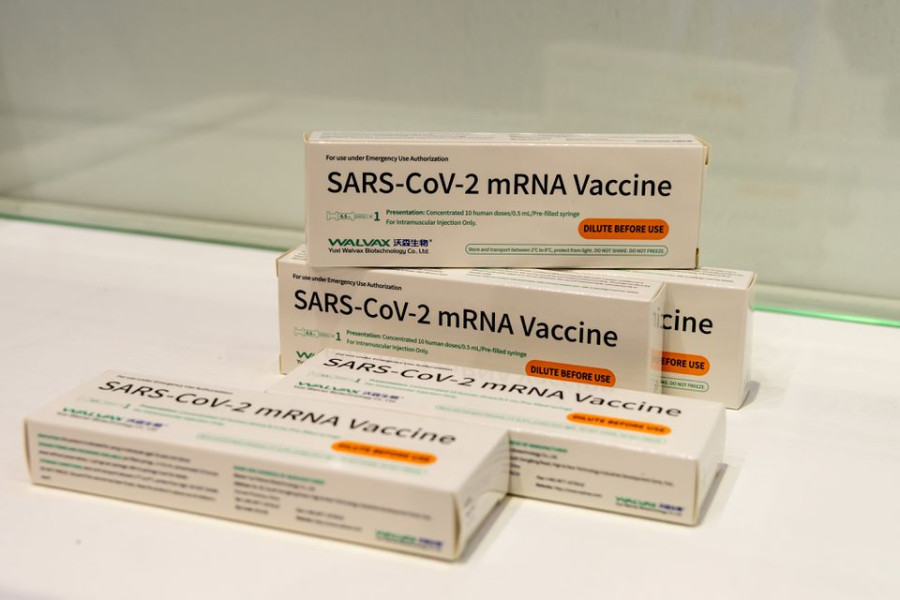Health
Phase III trials of Chinese mRNA Covid vaccine in Nepal cancelled
Trials of two other Covid vaccines have been running smoothly, according to officials.
Arjun Poudel
Phase III clinical trial of ARCoV, a Chinese mRNA Covid-19 vaccine candidate, will not take place in Nepal, as the vaccine manufacturing company has decided to cancel the study.
The vaccine being developed by the Academy of Military Medical Sciences, Suzhou Abogen Biosciences and Walvax Biotechnology was the first to get permission to conduct phase III trials in Nepal.
“Last week, we were informed that the study will not take place in Nepal,” Dr Sanjib Kumar Sharma, principal investigator of vaccines at BP Koirala Institute of Health Sciences, Dharan, told the Post over the phone from Dharan. “Vaccine manufacturing companies could not supply vaccine doses and other necessary equipment to carry out the phase III trial.”
On August 26 last year, a Cabinet meeting had decided to allow a messenger RNA (mRNA) Covid-19 vaccine of the said companies to conduct a third phase trial in Nepal.
The manufacturing company had collaborated with Deurali-Janta Pharmaceuticals Pvt Ltd to carry out human trials in Nepal.
And the vaccine manufacturing company had also agreed to transfer the technology to manufacture the vaccine in Nepal and supply doses in a concessional price if the clinical trial succeeded.
“The first phase study or enrollment of the vaccine was supposed to be completed by last October,” added Sharma. “They (vaccine manufacturing company) also took a lot of time to cancel the study.”
There was a plan to administer the Chinese mRNA vaccine to 3,000 people at BPKIHS. For the study, several doctors, nurses and other health workers were hired.
Sharma informed that the Deurali-Janta Pharmaceuticals Pvt Ltd provided the salaries to the health workers—doctors, nurses and others–after the vaccine manufacturers informed them that the planned study in Nepal has been canceled.
The Post’s attempts to contact officials at the Deurali-Janta Pharmaceuticals Pvt Ltd was unsuccessful.
A new study has shown that a Chinese mRNA vaccine candidate saw a significant drop in its ability to neutralise the Omicron strain of the coronavirus compared to its effectiveness against a wild-type strain with no major mutations–but that a booster could readily induce the production of the neutralising antibody.
Sharma informed that he has informed the Nepal Health Research Council about the vaccine manufacturing company's decision not to carry out study in Nepal.
“I am not informed about the decision [of the vaccine manufacturing companies] to cancel the phase III trial of the Chinese mRNA vaccine,” said Dr Pradip Gyanwali, member secretary at the Council. “Even if the study of one company has halted, the studies of two other Covid vaccines have been running smoothly.”
Along with the ARCoV vaccine, two other new Covid vaccines have taken approval to carry out Phase III trials in Nepal.
“We have completed administration of the vaccine,” Dr Rajiv Shrestha, Nepal’s National Principal Investigator of Sonafi Covid vaccine told the Post. “We have administered vaccines to around 800 people from Dhulikhel Hospital.”
Sonafi is a French multinational company, which in partnership with GlaxoSmithKline (GSK), has developed a Covid-19 vaccine.
The vaccine manufacturing company had decided to carry out a study on 4,000 people at the Nepalgunj Teaching Hospital, Tribhuvan University Teaching Hospital and the Dhulikhel Hospital.
But due to an aggressive vaccination campaign in Nepal, the number of participants in the vaccine trials has remained low.
According to Shrestha, preliminary analysis of the vaccine shows encouraging results and no side effects have been detected in the volunteers.
Another Chinese company—WestVac Biopharma Co, Ltd has also taken approval for the final phase trial of its mRNA vaccine. Officials at the Council said that the study is ongoing at the Bharatpur Hospital.
Nepal has used viral vector Covid-19 vaccines—Vero Cell, AstraZeneca, Janssen–and mRNA based vaccines—Pfizer-BioNTech and Moderna.
If the Sonafi study succeeds, the vaccine manufacturing company could supply doses to Nepal at a relatively cheaper rate. Sonafi’s will be the first protein-based vaccine in Nepal.
Nepal so far has received 47,882,800 doses of vaccines—AstraZeneca, Vero Cell, Moderna, Janssen and Pfizer-BioNTech.
As of Sunday, 17,664,516 people or 60.5 percent of the total population have been fully immunised against Covid.
On Sunday 262 people tested positive for Covid–229 in 6572 polymerase chain reaction tests and 33 in 3,243 antigen tests. In the last 24 hours, four people died of coronavirus infection. Active cases stand at 12,244 throughout the country.




 8.79°C Kathmandu
8.79°C Kathmandu















